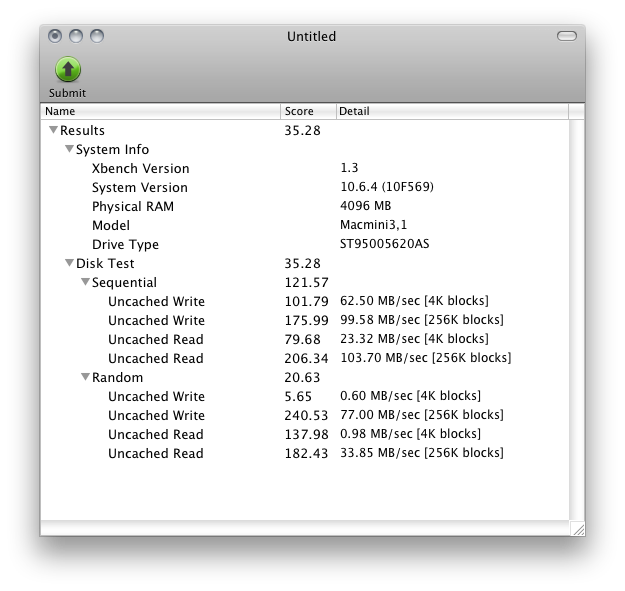
- #XBENCH TEST MAC OS X#
- #XBENCH TEST INSTALL#
- #XBENCH TEST DRIVERS#
- #XBENCH TEST DRIVER#
- #XBENCH TEST PRO#
Starting with the frame, like most all of Scan-Speak’s midwoofer/midrange frames, the 21WE/4542T00’s frame is a really nicely configured six-spoke (three double spokes) cast-aluminum frame with narrow 19-10 mm wide spokes to minimize reflections back into the cone. As with the 18WE, the 21WE/4542T00 is a seriously feature rich transducer (see Photo 1). This month, Scan-Speak sent me the latest iteration of the Ellipticor product line, the 8” 21WE/4542T00 midbass woofer, which is the big brother to the 18WE/4542T00. I should also note that the concept of using asymmetry to suppress diaphragm modes, not with an asymmetrical voice coil, but by using an asymmetrical diaphragm with a round coil was patented by my friend and consulting associate and extremely clever transducer engineer Enrique Stiles, in US Patent Number 7177440. By driving the diaphragm asymmetrically using the oval voice coil concept, what you get is an “infinite” number of Eigen frequencies, but with less contribution for each frequency and overall lower distortion.ĭriving the diaphragm symmetrically you get a finite number of Eigen frequencies with a higher contribution combining at certain frequencies producing the “dreaded” coloration modes.
#XBENCH TEST DRIVER#
One of the goals for a new driver concept at Scan-Speak was to minimize cone modes, so it was kind of a joke to suggest an elliptical voice coil, but it was engineering humor that had some solid science behind it. Evidently, the idea of using elliptical-shaped voice coils to control cone and dome modes came from an engineering brain storming session that involved Birger Jorgensen (sadly, Jorgensen passed away nearly two years ago).
#XBENCH TEST DRIVERS#
The timing was started using a stopwatch from the moment the "Save" button was clicked until the encoding finished.Table 1: Data comparison for the Scan-Speak 21WE/4542T00 midbass woofer.Īnd, the first oval voice coil Scan-Speak Ellipticor drivers characterized in Test Bench were the 18WE/4542T00 and the D3404/552000 (Voice Coil, April 2018).
#XBENCH TEST PRO#
mov file and exported it for iPod using all of the default Quicktime Pro settings. The final set of benchmarks that we ran on these three troopers was a Quicktime encoding benchmark. Still, the MacBook Pro performed a little better than I expected after having watched it chug through the tests. The MacBook Pro looks to have done exceedingly well in both of the shading tests, until you consider that the Dell's Windows XP Cinebench scores for those two tests blew the MacBook Pro out of the water while running on graphics drivers that aren't hacked. On the single and multiple CPU rendering tests, it performed very similarly to the Dell running OS X (to stay consistent with the rest of our benchmarks with that machine). Watching Cinebench run on the MacBook Pro hurt a little, even though it appears to have outperformed the other two machines on the various tests. Cinebench is interesting because it does a number of 3D tests based off of Cinema 4D and is available for both Mac and Windows, so it can be very representative of a machine's capabilities against one another.

In addition to XBench, we also decided to run Cinebench 9.5, which is now also available in Universal Binary. All other scores appeared to remain mostly constant, with the only other noticible change being in the Quarts Graphics Test score, which increased to 79.11 from 51.02.
#XBENCH TEST INSTALL#
I also ran XBench with Beam Synchronizing disabled on the MacBook Pro (which requires you to install the Developer Tools) and got a score of 161.15 in the User Interface test, a significant increase from the previous score of 27.52.
#XBENCH TEST MAC OS X#
One can only imagine what Mac OS X would be like on it if it were actually supported! Without that score factored in, the Dell performed pretty well comparatively. Overall scores for the three machines were about what was expected, with the MacBook Pro standing at 53.71, the AlBook G4 at 45.73, and the Dell P4 at 22.96a score no doubt affected by the exceptionally poor performance in the User Interface test. Isn't it nice to have a real FSB in an Apple portable? On the memory test, the MacBook Pro's RAM was significantly faster than the PowerBook G4.

The CPU test results were rather close for all three with some minor differences, and of course the MacBook Pro spanked the AlBook on the Thread test (while beating the Dell by a smaller margin). Both the AlBook and the Dell scored higher on the disc test, which makes sense in the case of the AlBook, since it has a 7200rpm drive. For one, the Aluminum PowerBook G4 mysteriously scored higher on the User Interface test than both of the other machines. Some of these results are surprising, and some are not.


 0 kommentar(er)
0 kommentar(er)
